 newsitems
newsitems
newsitems
CoE International Conference: Journalism's future to ally new Digital Media and Deontology from 2010
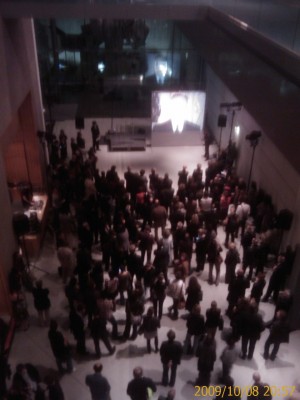
European Journalism has a future, despite the current crisis, if it succeeds to bring together a free and critical spirit, innovative Digital Media and Deontology, with first practical moves starting from 2010 : That was the main thrust of an International Conference at the CoE
Despite a full-week long programme (5 to 9 October : from early morning up to late evening !), plenty of various events on "Journalism's future", organized by the CoE and the Association "Citizenship and Journalism" headed by Jerome Bouvier; former Director of RFI, spreading from Human Rights issues, to Financial, Social, Educational, Technical and other aspects of any Journalist's' job, a majority of participants clearly plebiscitated these 2 key points, which were also highlighted in the anouncements made at French Minister of Culture, Frederic Mitterand's concluding speech.
---------------------------
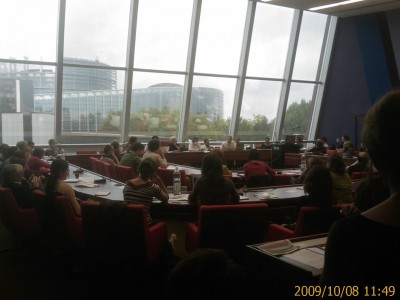
Upbeat about the immense possibilities, including financial, for the development of On Line versions even of old, traditional Media, after the strong belief expressed earlier in Strasbourg by the Economic Newspaper ''Echos' Director, it was now the turn for generalist News-Magazine ''L'Express'' Internet version's Director, Eric Mettout, to tell ''EuroFora'' his own belief that the On line Press can find in future enough Funding, without blocking the News by payment requests, but thanks to other, parallel and innovative ''various resources'' resulting through the main website, (f:ex. by the growing on-line Publicity, by organizing various related activities, partnerships, etc, or by creating new digital services, fex; giving access to Data Bases, etc).
''World Editors Forum'''s Director, Bertrand Pecquerie, stressed that, currently, it seems that the Future belongs to the Internet, (as well as to the "hyper-Local"), Media.
Even former "Le Monde"'s director, Jean-Marie Colombani, jumped at the last-minute into the www boat, declaring later, (with 1 day delay to his initial schedule), that "the revolution of our times is that of Internet Media".
Even if he never explained yet why he had taken the controversial decision to practically exclude many hundreds of active and sometimes innovative writers who had published thousands of often interesting News-texts at "Le Monde"s Forums, between 2001-2004, by suddenly imposing, (against any Forum's rules) to betray the Personal Identity of any Writer, by having to give even his Bank account details to pay an amount of money (contrary to all other Web Forum's general practice), before even taking the risk to publish a line on "delicate", "hot" issues.. A blunder (or indirect censorship ?) which notoriously obliged hundredrs, (and mainly the best "Le Monde" Forum's writers, who had build themselves its reputation), to leave it empty, until it was downgraded in a never seen before low level..
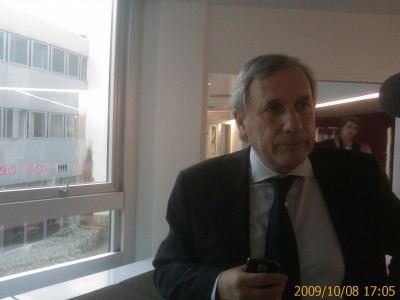
Was it simply because he had guessed that the French Minister of Culture, competent also for the Press, would make strong anouncements to encourage the new Online Media, later in Strasbourg ?
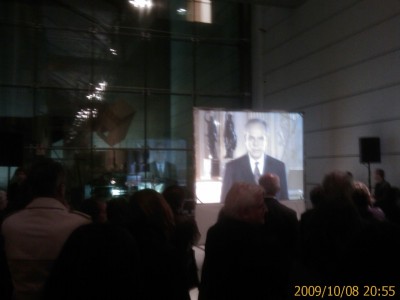
- Despite a last-minute provoked obstacle which unexpectedly hindered him to come to Strasbourg, contrary to what was scheduled, the competent Minister Frederic Mitterand, indeed, launched a vibrant call, (through a Video-link from Paris to Strasbourg), inviting all "On line Editors to be ready for 2010" :
- "The new status of On-line Editor opens the way to a Fund which will have 20 Million € in 2010", he stressed, (in addition to the aid towards traditional paper-printing, "which has been out passed by the digital revolution")
Meanwhile, "the Digital Press Editors can already acquire a Legal Security, thanks to relevant measures recently taken on the Legal field fex. on Copyright at the Internet,, the Minister observed, before anouncing that he asks Bouvier to help prepare a 2010 Deontology Charter "to defend Journalism's Values". (See infra).
The 2nd stage of the popular Assemblies for the Press ("Etats generaux") will start soon, he anounced.
-----------------------------
This week's events practically started with a memorial for killed Journalists Anna Politofskaya (the well-known dissident specialized on Tchethcen affairs), and Jean Helene (a former ..Economy student from Strasbourg, who became Press Reporter in Africa, and RFI's Top Journalist, before being killed during a risky reportage).
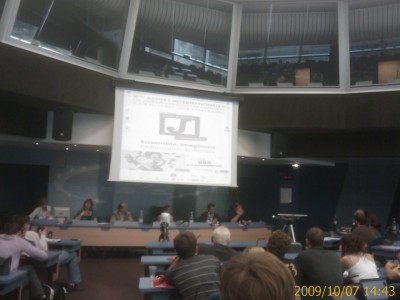
In contrast, an interesting, but disappointing session, where a small group of closely interlinked pals obviously wanted at any price to impose the view that "European Journalism doesn't sell, because it doesn't interest the readers", for whateever reason, almost turned into a scandalous ...censorship, when "EuroFora" dared support a minority of journalists who expressed an opposite view :
- "During more than 15 years of specialization in European News, we saw bureaucracy and waste, censorship, threats and aggressions, oppression of liberty, collegues who "disappeared", etc, but we never saw the so-called mythos of European Citizens' indifference to EU/CoE News ! On the contrary, among many examples, Families of "MISSING" persons and other citizens take the initiative to pay expensive International Phone calls or to write Letters to Strasbourg to ask us for "fresh" News, beyond the usual routine bla-bla in mainstream Media, while a New Agency suddenly won a European prize for breaking a record of popularity since 1999 after we started publishing there thousands of original EU/CoE News that People couldn't find elsewhere...Even during an exceptional visit for a UNO's Summit at its New York Headquarters, we were surprised to find out that our Newspaper decided to publish as "First Page" Headline News an original reportage we had send not about Global, but ...European News, (a statement about imminent decisions in Strasbourg and Brussels), At another occasion, a too "hot" News obtained at the CoE during a very ''delicate' Political context was brutally censored, while, ...2 Years (sic !) later, when the political context had changed, the SAME Info became, afterwards, Headline News at mainstream Media such as CNN, BBC, etc.. Conclusion : In fact, it's the freedom, the capacity and the will to find and publish original, critical European News, on "Hot" issues, which are not reported by routine mainstream Media; without being afraid of any ''consequencies'' if it's true and useful to the People, that counts'', ''EuroFora'' tried to conclude, but we were astonishingly interrupted and censored, with a strange brutal insistance, by one of the 2 or 4 pals who had got hold of the Microphones, of the ''Moderation'', etc, obviously eager to impose a pessimist view, at any price..However, ''EuroFora''s opinion, even if obviously ''dissident'', tried to explicitly integrate also some other converging remarks, exceptionally made by various collegues, in a similar direction : Fex; Fr 3's Francoise Schoeller's observation that "People are often thirsty for European News, if they are well presented": Or Jean Quatremer's point against his Editor in chief, who claiming that "polls show" a weak interest for EU News, refused publications, ''which attract many people at my NewsBlog", as he said, complaining also for the Editors' insistance to "make brief" and send the News so "fast" that there is "No Time for Investigative Journalism": Or a Portuguese collegue's observation that her bi-weekly radio-tv spot was upgraded thanks to EU/CoE News, etc: But this didn't avoid a strange censorship, (after too long delays to let us free to say at least some words) by the same small grouplet of 2 or 3 networked individuals (including a retired former journalist), who insisted to impose; at any price, their view that, at any case; "European Journalism doesn't interest" nobody and "doesn't pay", (with a curious dogmatism)..
Differend ambiance, next day, at another CoE workshop, about Journalists' legal "status", which had apparently gathered at least a few serious journalists :
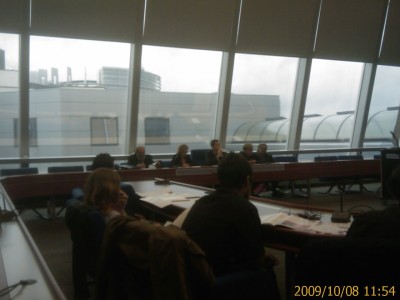
- "From the very start of a period of 15 years of European Journalism's work, until now, we were often surprised, and sometimes even shocked by the "Gap" which often exists between ECHR's case-law on Freedom of Expression, which protects Journalists' Liberty, and some Bureaucratic conditions or restrictions on formalities about national or other "Press Cards", which might be, perhaps, useful for Financial, Commercial, or Taxation reasons, but have nothing to do with what is the "substance" and the real "specificity" of any real Journalist's work : To find original and critical News to publish on "hot" issues affecting the lives of the People and of general interest to the Society. On the contrary, we often see that individuals who do nothing of that, in some Countries they may keep their "Press Cards" for more than 10 Years while being employed by the Government at absolutely differend jobs, without any independance, and without doing nothing as a journalist for years;;;, Or that a former Journalist, fex. even after being hired as a simple "Assistant" of a MEP; nevertheless continues to exert unfair competition; to abusively block/delay infos, etc. vis a vis working journalists; etc., provoking grave damages: But, at the same time, several real Journalists, who do nothing else than to search and publish original News on "hot", "delicate" issues of general interest to the Society (according to ECHR's case law) , often risking even their health, career; liberty or life, are delayed or even refused, under various bureaucratic or commercial pretexts, this or that national "card", (or, simply, don't ever find enough Time to stop working for the News and waste many hours, days, weeks or months, etc. on bureucratic formalities.. Or this raises sometimes, serious problems of Freedom, protection from various threats, dangers or even aggressions, when they work on "hot" issues, etc, "EuroFora" observed, citting, fex. the "shocking" case of a murdered Journalist who was brutally shot down by gunmen in front of his Family Home, back in the 1990ies, but was scandalously refused even the slightest verbal expression of solidarity by a so-called "Chairman" of a corporatist "Association", on the sole pretext that the murdered victim of brutal aggressions obviously motivated by his writtings, has "no card" ! (While, on the contrary, at the same time, EFJ/IFJ's Secretary General Aidan White, and others, wrote sharp Letters strongly denouncing he murder and asking the competent Authorities to find and punish those responsible for the murder).. In conclusion, "EuroFora" suggested to focus on the Deontologic core which is specific to any real Journalist's task, according also to ECHR's case-law, whenever people may have to judge about his:her status, and leave all the other, financial, commercial etc. non-specific matters aside, in order to be settled in another; more adequate way.
This was kindly heard, and even if someone focused unilateraly only to the "unfair competition" point, other Journalists (even from the infamous "card" commissison), immediately appeared more motivated to ask "EuroFora" various questions on the "protection of Journalists' freedom" main point, (either observing that the "Card Committee" often attributes some Press Cards to certain Journalists who really need some protection for their elementary liberty, integrity and/or life, or asking to learn more about the case of the murdered Journalist who was scandalously refused any solidarity by a petty bureaucrat under pretext thet "he didn't have a card")...
During a previous CoE Conference on "New developments on Freedom of expression", co-organized at the European Court of Human Rights together with Strasbourg University's Public Law's department headed by professor Constance Grewe, with the participation of European/International Federation of Journalists' Secretary General, Aidan White, the idea floated about linking the protection of Journalist's freedom, based on their main aim to provide original information to the public on issues of general interest to the Society at large, and their commitment to respect an elementary Deontology :
Such moves might open a possibilty to overcome the current "crisis" of traditional Press by finding "new allies", mainly at the Internet, as Aidan White had concluded.
2009 International Conference on Journalism's organizer, Jerome Bouvier's, and French Culture Minister Frederic Mitterand's this week's declarations on the need to forge a "Deontologic charter" freely adopted by Journalists in 2010, can obviously go towards such good directions...
CoE's Director on Culture, Media and Ecucation, Mrs Gabriella Battaini-Dragoni, told "EuroFora" that CoE "is ready to provide help, if Journalists wanted", for the preparation of a panEuropean Deontology charter for Journalists, "but doesn't want to interfere, unless they ask us to do so".
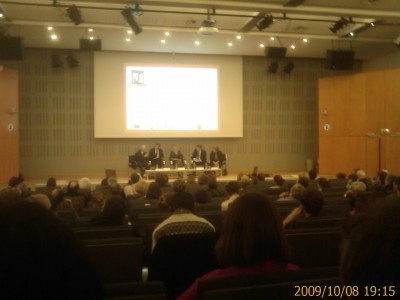
Meanwhile, at a concluding session dedicated to "Politicians' expectations from the Press", ChristianDemocrat/EPP EuroMP Jean-Marie Cavada (a well-known former Journalist), focused on Journalists' "Freedom", Socialist MEP Catherine Trautman rather preferred to stress their "Independence", while Leftist politician Clementine Autain, asked to give Journalists "Time" to think .
How kind of all three of them, if they really believe what they said.. "EuroFora" always believed, (rightfully or erroneously), that real Politicians are Journalists' best "real-politic" allies : Simply because they are the first who will benefit if Journalists are really "free", "independent", and with enough "time" to work well !..
GRECO President Kos to EuroFora : Corruption is a common threat for all Europe, the US and beyond
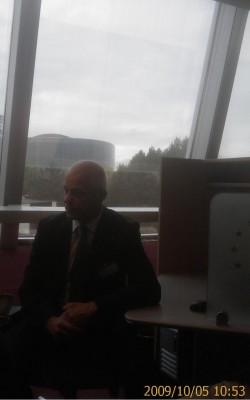
Transparency on Political Funding and Criminalisation of Corruption, while extending investigation also to Local/Regional level, are the next steps by CoE's anti-Corruption body GRECO, (to which participate even USA), anxious to prevent a duplication by the EU which risks to split Europe in 2 different parts, as his experienced President, Dragos Kos (2002-2009) said to "EuroForra".
Corruption affects both "People's trust to Democracy", provokes Discriminations affecting Human Rights, and can even deprive States from 30% to 50% of their normal revenue, (losing up to 3,8 Billion $ each year in Turkey's case), stressed key participants at an exceptional Summit of CoE's Justice Ministers to take stock of GRECO's 1st Decade (1989-2009), where the way Germany dealt with Siemens' case, dating from 2000-2004 with ramifications to other Countries as Greece and elsewhere, served as one key example.
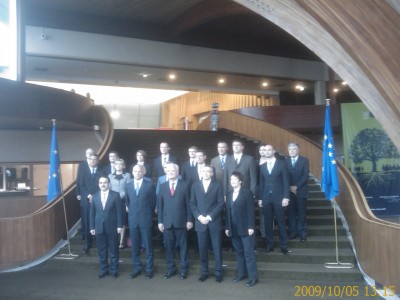
- "Corruption is a mortal threat to democracy, .. and may destroy People's confdence in political institutions and public administration", stressed from the outset CoE's deputy Secretary General, Mrs Maud de Boehr-Buquicchio, reminding "a series of politically-related corruption scandals in a a number of Western States".
- There are "frequent complaints", and a "serious problem in several European countries", particularly about "corruption in the Judiciary", which "favours people with money and contacts", gravely discriminating against and affecting Poor People's Rights, denounced the PanEuropean Commissioner for Human Rights, Thomas Hammarberg.
- "Corruption... destroys political equality,.. imposing an Oligarchy, ..erases the distinction between Private and Public Interest, and keeps representatives far away, instead of expressing citizens' needs, added French Justice Minister Jean Marie Bocquel, describing the French system of State Funding for Political Parties which accept transparency.
Starting in 1999 with less than 20 pioneer CoE Member States, GRECO succeeded in a Decade to gather today 47 CoE Member States, and to add also the USA.
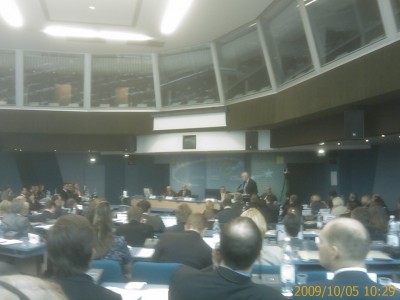
But, after EU Commission's June 2009 plans on "Justice and Home affairs", known as "Stockholm program", CoE faces now a risk of competition by new EU bodies, with which it prefers to closely cooperate.
Since EU debates and decisions are expected soon in EU Parliament and EU Council on December 2009, CoE must establish a kind of "Structural Cooperation" with the EU, which could, even if informal, regularly tackle joint planification and action issues in the common task to fight corruption, said to "EuroFora" CoE's Director on Monitoring, Christos Yakumopoulos.
-"In EU Commission's communication to EU Council, there are some sentences which could mean that there is some duplication of efforts. There is some wording implying that a new anti-corruption mechanism could be established within the EU'; confirmed to "EuroFora" GRECO's President, Goran Kos from Slovenia, denouncing risks to provoke "gaps" between EU members and other european countries.
- "I don't think that we need something like that. Because it will lead to duplication of efforts, dilution and waste of resources, and I don't think that all member states would support such an idea". - "We have to increase cooperation with the EU, because it doesn't really make sense now : We (CoE) are planning our way forward, they (EU) are planning their way forward, and there is no real coordination".
- "Really it could be tricky if EU and CoE didn't join efforts. Otherwise, Europe could face very dangerous phenomena, : This could lead to a full split of Europe in 2 differend parts. If we are talking about a unified Europe, this is a separation which is not normal " - "Moreover, if we talk about Corruption, it's dangerous for all countries in Europe. It doesn' make any difference if these countries are EU members or not. We all face the same threat", GRECO's President said, agreeing with "EuroFora" that, "of course", "corruption networks can go beyond EU Member countries"..-
---------------
Corruption may cost up to 30% or 50% of a State's revenue : F.ex. in Turkey Corruption usurpates more than 3,8 Billion $ each year, (i.e. almost .. 4 times the amount of EU's annual aid !), and in Croatia some 0,25 Billion $ per year (i.e. 55 $ per inhabitant), denounced the President of CoE's PanEuropean anti-Corruption watchdog.
In other countries, as fex. Greece or Cyprus, even if almost every Legal mecanism useful against Corruption already exists, nevertheless, ..practical "results could be better", GRECO's experienced President (2002-2008) criticized, in reply to an "EuroFora"s question. For all Europe, a key issue is now "implementation" of CoE's anti-corruption standards, Kos concluded later at his official speech.
----------------
Kos, replying to another journalist's question, agreed that Germany dealt efficiently with the Siemens case, - "We (GRECO) learned a lot" with the way that Germany investigated that case, and "Siemens seriously changed" after that. "But, on the other hand, in Germany they didn't yet introduce a full criminal responsibility", he observed. And this was stressed also by the CoE Chairman-in-office, Slovenian Minister of Justice, Ales Zala. who added to the out-going, Socialist German Minister Mrs Zyries' description of the Siemens' case, that those responsible for corruption must know that they will face consequences "not only on their careers, but also on their freedom".
The lack of full Criminalization of Corruption provokes sometimes serious problems : In Germany, f.ex., despite a succesful fight against corruption in "Siemens"' case, investigation was concluded as far as the enterprise is concerned, "since December 2008", and with participation of experts from the USA, since said to "EuroFora" Munich's Head Prosecutor Manfred Nötzel.
. But the part of the case which concerns Greece (illegal funding of Political parties) notoriously risks to be blocked, because a suspect which is also a key witness, arrested in Germany, opposed extradition to Greece, as well as investigation in Germany itself, claiming that a minor sanction existing there had been Time-barred !..
As for transparency on Politicians' funding is concerned, in theory, this might go as far as to check even ..new US President Barack Obama's notoriously record-braking 2008 campain budget, which succeeded to raise many hundreds millions of euros, more than any other candidate in USA's History
- "Yes, of course", USA is among the countries which will be checked by GRECO's team, for the 1st time, also about politicians' funding, GRECO's President confirmed to "EuroFora".
- "At the beginning, when we spoke about that, there were strong reactions. But afterwards, we have been (positively) surprised by political parties' trasparency on funding", said to "EuroFora" Kos.
However, "it's from December 2009 that we shall start to discuss the first Reports". And "we know that some countries have serious difficulties about that. We (GRECO) are eager to see what wil be the 1st reactions and results"
But, "the time has come" for Corrution risks to start to be checked also "at a Local and Regional level", (particularly in Countries with large Decentralisation). Until now we (CoE) didn't know what was going on a the Local level, despite the fact thet "it often faces significant Corruption risks in daily operations", GRECO's President concluded, speaking timely at the eve of the PanEuropean Congress of Local and Regional Authorities' 2009 session next week in Strasbourg.
1989-2009 Gorbatchev 20 years after: PanEuropean Debates in Strasbourg to realize Europe's potential
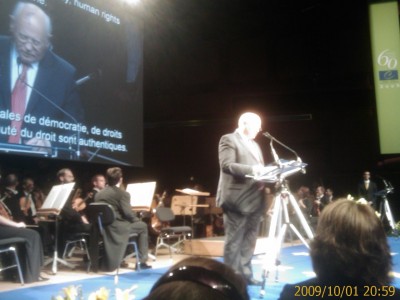
-"Since (Russian) President Medvedev gives us his hand, we'd better accept it", stressed new French Minister for EU affairs, Pierre Lellouch, to "EuroFora", on the Sarkozy - Merkel recent proposal to create a "common area" for all Europe and its closest strategic neighbours, including Russia, Turkey and other countries, after meeting with Historic former President Gorbatchev at the CoE, 20 Years since his venue in Strasbourg in 1989, which marked a vision of PanEuropean unity and started the proces of Europe's reUnification.
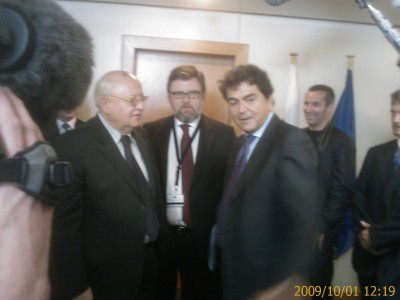
The potential of Europe cannot be fully realized without common aims between EU and Russia, from Security, Economy and Environment to Democracy and Human Rights, he stressed, launching an invitation to start paneuropean dialogue and debates in Strasbourg.
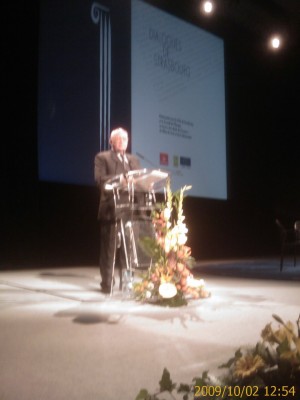
We, Europeans, are placed in front of "a truly unique Historic Opportunity". We need a "new structure" on Security issues, but CoE plays a vital role and can realize its full potential if it remains faithful to its Human Rights', Democracy and Rule of Law Values' real dimension, without double standards, he added speaking at an exceptional ceremony for CoE's 60th Anniversary, joined also by EU Commission's President Jose Barroso.
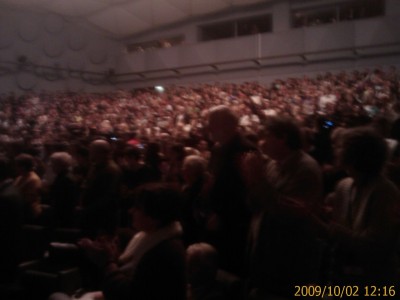
Welcomed with laud and enthousiastic applaudissements by more young people that Schweitzer's amphitheater could normally contain, obliging the surprised organisers of the event to kindly refuse numerous visitors who outpassed their expectations, Gorbatchev was immediately questioned in 2009 by the same person who had welcomed him officially when he had come in 1989 as the 1st Russia's President to speak at the CoE :
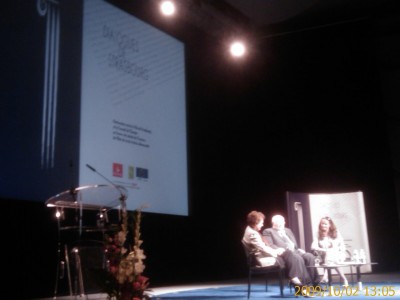
- "What's for you the Identity of that greater Europe as a whole, from the Atlantic ocean to Ural mountains, that you have spoken of, after General De Gaulle ? What makes you believe that there is "something" existing there" which can unite the people ?, asked him professor Francoise Lalumiere, the former CoE's Secretary General and current director of Paris' "European Home".
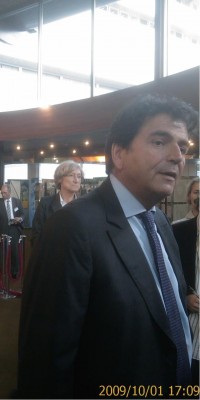
- "I know that many things in History have started with France", observed Gorbatchev earlier, at his meeting with Lellouch. But now, he curiously appeared as if he had been outpassed by Lalumiere's querry : - "That's a typically French question", he smiled back with friendly criticism, before structuring the issue in a quite differend way, as a man forever marked by the fact that he had, first of all, to think Global, situating Russia mainly vis a vis the USA, back in the 1989 old period when the most urgent need was to end the former "Cold War" at first, before having the time to really think about anything else.
But, at various key-moments, he stressed "Europe's enormous Cultural potential", and called himself to "keep our European Identity"...
However, Gorbatchev was strongly critical about the way previous European Governments misused until now the Historic opportunities opened for a reUnification of a greater Europe, 20 Years after his 1989 breakthrough proposal to create "a common European Home" and the fall of Berlin's wall, that Chancellor Merkel is currently preparing to celebrate on November 9, 2009 :
- I want to see, during my life-time, the result of what we did in 1989 by bringing in Transparency ("Glasnost") and Democracy, ending the Cold War, and proposing to create "a common Home in Europe", Gorbatchev stressed 20 years later in 2009 Strasbourg.
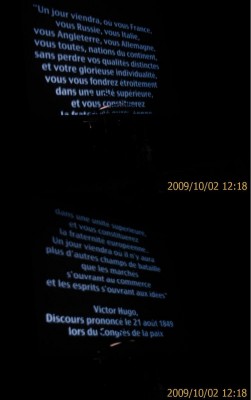
It's also nearly 2 Centuries since famous writer Victor Hugo addressed an International Peace Conference by expressing his belief that "the time will come when, France, Russia, Italy, England, Germany, and all countries of the continent, without losing their distinct qualities and glorious individualities, will forge together a superior entity, and become the European Fraternity",
that Gorbatchev had cited at his historic CoE 1989 speech, as it was reminded now, and was also highlighted during the 2008 French EU Presidency.
But, instead of that, some attempted to provoke new tensions and dividing lines in Europe, while "irresponsibility of some businesses", and economic reforms made in a too harsh way, threw to poverty millions of people, and provoked an "enormous disappointment", he regretted.
The current Global "Crisis" worsens things, added to "enormous Environmental problems", and if it's treated "only with fire-fighting methods", then, "the next Crisis wil be more enormously destructive", he warned.
Reacting to questions on dissident Journalist's deaths, related to Tchechnya and North Caucasus' tension and terrorism, (which has recently aggressed or killed also many Governemental officials, even some well known for their pro-reform and democratic trends, as it was denounced by NGOs at the CoE), Gorbatchev regretted that some journalists faced tragic situations when they came close to "power struggles", and "become targets", as he said. "We need improvements, on Elections, Media, etc", he observed
- "It's important that our Common European Home is based on foundations respecting freedom of Press and Human Rights", he added at a following question.
But, some looked eager only to "isolate" Russia and "get the spoils" from a demembrement of former USSR and afterwards of Russia, even if such threats are now out-dated, particularly after Russia succeeded to protect its territorial integrity, and overcome a previous "chaos", thanks to Putin's era, which "stabilized" things, he added.
And now Gorbatchev strongly advocated new Russian President Medvedev's proposal "to create a common PanEuropean Security Architecture".
Smiling, he didn't exclude that in future, "who knows ? May be it will happen for Russia to join NATO", as he said in reply to a question.
But, questioned on the EU, Gorbatchev carefully said that it raises the issue of "EU's definition", since, "if Russia entered into the EU, then, EU would extend up to Vladivostok", at the Pacific ocean, ...; Meanwhile, EU Member States are not ready to welcome Russia in, and Russia neither.
Meanwhile, even for other EU Enlargements, "EU has first to solve questions related to its Citizens, before any new enlargement", he observed.
But, earlier, "the fact that (Western and Eastern) Germans came together, helped Europe's reUnification", he said.
- "Our common aim should be to build this common European Home from both ends, from both Russia and the West". There are "big opportunities", and "CoE could play a key role", Gorbatchev preferred to say
What is important is that Europe should seize an Historic opportunity to realize its "enormous Cultural potential", and "live really up to its Human Rights values", without double standards.
On the contrary, "without Russia it would be impossible for Europe to fully realize its potential", Gorbatchev warned.
He spoke after CoE's Assembly debated and adopted a Report drafted by the Head of France's delegation, ChristianDemocrat/EPP MEP Jean-Claude Mignon, on Europe's "Future", which observed that CoE, in addition to being the Human Rights, Democracy and Rule of Law PanEuropean Organization, is also "a broad, inclusive Political Forum, encompassing EU Member and Non-member States, Russia and Turkey in particular, and open to political and intercultural dialogue with neighbouring states in Northern Africa, the Middle East and Central Asia", as fex. Kazakhstan, etc.
Among other concrete proposals, Gorbatchev cited an example that "EuroFora" has been strongly supporting at least since 2005/2006 : - "F.ex. I had proposed to former French President Mitterand to create PanEuropean Transport corridors all accross the continent. He seemed to agree. But, many years afterwards, nothing was done !", he criticized.
Gorbatchev probably doesn't realize that the recent project to create a High-Speed Train link called "Magistrale", between Paris, Strasbourg, Munich, Wien and Budapest, could perhaps be the 1st step in this direction : Russian Trans-Siberian railroad has recently approached Budapest, making it easier for Strasbourg's extension to provide the strategic "Missing link".
This strongly reminds what could be former French President Jacques Chirac's real conclusion, after a long career at top responsibilities : Welcoming German Chancellor Merkel and former Russian President Putin, current PM, at Compiegne Castle back on September 2006 (only a few months before he quits from office), he ended it all up by showing them the most spectacular, symbolic image : An impressive overall view of a huge, immense avenue, long of many kms, opened among surrounding forests and leading up to a high hill, that Napoleon had created himself, in the front of the historic castle, which contains a superbe, symbolic painting called "Napoleon's dream".
- In the only writtings Napoleon left to history, when he was deported and held prisoner at Saint Helen's remote island, it's astonishing to find out how important was for him the idea of a greater Europe as a whole : He had rightfully warned, that after what he thougt to be a betrayal of 18th Century's Revolutionary Democratic "Enlightenment" ideas, (which had inspired also a German as Beethoven to write his famous "Heroic" music at the honor of France's Napoleon, in addition to his famous "Ode to joy" which became now EU's anthem), Europe risked to face a long era of tension, uprisings, division and Wars, provoking destructions and weakening its potential.
That's precisely what happened since those times of 1810-1815, with revolts succeeding one another, (1830, 1848-9, 1871, 1917, etc), Franco-German and World Wars (1870, 1914-1919, 1940-1945), followed by a long Europe's Division and "Cold War" (1948 - 1988), etc., until the fall of Berlin's wall (1989), Russia's entry at the CoE (1995), and Germany's reUnification, extended to EU's Enlargements Eastwards in 2004 and 2007, started to change the situation.
If new French President Nicolas Sarkozy hadn't already succeeded to take a notoriously efficient initiative to stop the Russia - Georgia war back on August 2008, and hadn't proposed later in 2008, while he chaired the EU, a concrete measure to overcome risks for a renewed Russo- American tension in Europe, by provisionaly "freezing" both the American anti-missile shield and the Russian counter-measures in rockets and missiles' deployement overseas and at Europe's heart at Kaliningrand, until OSCE starts discussing Russian President Medvedev's proposal to create a PanEuropean Security mechanism with the participation of all, US included, observers might say that it was his subsequent 2009 Summer meeting with Chirac, at his family ressort, which might have helped a bit to think anew about Russia.
It's as early as since CoE's 2nd Summit of Heads of State and Government, back in 1997 in Strasbourg, that Chirac, together with former ChristianDemocrat German Chancellor Helmut Kohl, (the "father" of Germany's reunification), and former Russian President Yeltsin, had decided to initiate a formula of Franco-Germano-Russian Summits
But Sarkozy's well known good relations with the USA too, including with new US President Obama, (reflected now even at Lellouch's fresh nomination as new EU affairs Minister, after being a long-time NATO specialist and enthousiast), particularly after the Historic return of France to NATO's military component at Strasbourg's April 2009 NATO's 60th Anniversary Summit, obviously provides a better "balanced" approach, more credible overseas, on matters concerning Russia : Thus, after obtaining also German chancellor Merkel's agreement, Sarkozy openly presented the idea to create a "common area" in Europe with Russia, Turkey and other european or neighboring countries, during Obama's latest Paris' visit.
-------------------------------
However, Gorbatchev's most striking move, which might give a new Historic mark to his 2009 CoE visit, was to play a familiar note to "EuroFora"'s ears :
=> The experienced and historic former Russian President concluded by launching a vibrant call for large, open, frank and friendly "Dialogues", Debates, and exchanges of views, at a kind of PanEuropean Fora, with modern Media which can usefully contribute into bringing together all European Countries, including Russia.
- "We must not be afraid to take up the challenge of Dialogue", he said. On the contracry, "We need to talk. We need Debates and Discussions", he stressed.
Putting also Germany at the spot-light, Gorbatchev observed that he found really useful the Saint Petersburg Forum's dialogues with young people from Germany and Russia, and he advised to extend and further develop the idea, at a PanEuropean level, at CoE's headquarters in Strasbourg.
Gorbatchev was speaking under a huge painting of an ancient Greek column of white marble, (famous symbol of Parthenon's cradle of direct Democracy), to which were added the key-words : "Strasbourg's Dialogues".
Co-organized by CoE's Director of Communication Seda Pumpyanskaya, and Strsbourg's Mayor Roland Ries, the 2009 event may be didn't expect to succeed beyond its own expectations, and attract such proposals to extend beyond its initially unique, one off, character.
=> But Gorbatchev's 2009 move went exactly in the direction of "EuroFora"'s project, initially presented in Strasbourg and Brussels since 1997, a year after Russia's official full accession to the CoE (in 1996, which also brought USA in Strasbourg with a "special status" in 1995) :
That's why "EuroFora" was conceived from the start in a manner which opens the way also for Russian language to be simultaneously used, together with English, French, German and other European languages, as its 2007 relaunch with the original structure of "Elxis" CMS Multilingual software and its Forum's automatic translations including to Russian, clearly indicates
5 differend Journalists and experts experienced in European affairs, fluently speaking Russian, have already proposed to cooperate with "EuroFora" in Strasbourg, in the direction suggested now by Gorbatchev.
As Gorbatchev himself reminded in 2009, already back in 1989, "a lot of peaceful revolutions became possible", "without interfering", he claimed, but because "we had started with Glasnost (Transparency), and gave Citizens the possibility to freely debate"...
CoE Chair Slovenian President Tuerk to EuroFora: EU-Croatia talks freeze/unfreeze = lesson to others
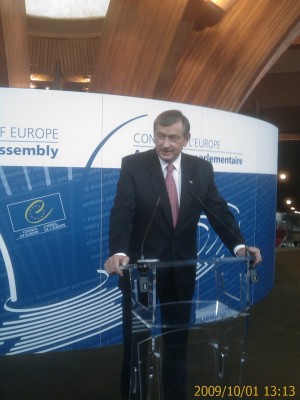
The suspension and the revival of EU - Croatia negotiations is a useful lesson also for other candidate countries (f.ex. Turkey, etc), showing that, instead of hidding problems, it's better to discuss and solve them according to EU criteria and obligations, f.ex. on "good neighbourhood" relations, replied CoE's Chairman, Slovenian President Danilo Tuerk to "EuroFora"'s question.
- ""We (EU) should never sweep real problems under the carpet", stressed the Chairman of the CoE. On the contrary, "the Key lesson is : "Never hide a problem !". Bring the problem from the bottom up. Negociate it, and find a Solution ! - " We have to find fair and just solutions to these kinds of things"
- "That's the lesson of our experience, of the problem that Croatia had with good neighborhood relations, which were succesfuly concluded", the Slovenian President said
- "I believe that (such) lesson learned, will be relevant for the Future,"
"and I am confident that these efforts will provide a way, that will help Croatia and then also others", he significantly concluded.
Tuerk said that to "EurioFora after Croatian President Mesic, speaking previously to "EuroFora" had reacted to the fact that EU - Croatia's negotiations had been "freezed", while EU - Turkey negotiations were still going on, by criticizing "Double Standards".
( See : http://www.eurofora.net/newsflashes/irish/sloveniacroatia.html )
The move came shortly after Cyprus' President Demetres Christofias launched a fresh call to the EU to convince Turkey to respect its obligations and stop refusing even to recognize Cyprus, aggravating the military occupation of its northern part also by discriminating against Cyprus' related Ships and Airplanes, threatening its sovereign rght to peacefully exploit Oil-Gas resources at its territoral waters, etc.
Greece had also, jointly denounced to the EU, since July 2009, a recent "escalation" of the frequent "violations of national airspace"" at the Aegean Sea reportedly by Turkish Military Airplanes.
- "Good Neighbourhood relations are, of course, part of .. the criteria that every Candidate has to fullfil", stressed now the Slovenian President.
- "This questiion has to be seein in the context of criteria for EU membership. Every Candidate (i.e. also Turkey, etc.) has to fullfil the criteria. And Good Neighbourhood relations are part of that, of course", Tuerk explained.
- "So, now, I am confident that the discussions we had in the recent past, (between Slovenia and Croatia) and the reform which has been defined these days will help",
He said that in reply to "EuroFora"'s Question if he thought that the way he handled the issue with Croatia, where he "was firm but also found a solution", strengthened the credibility of "EU's Copenhagen Criteria".
- " I am confident that these efforts will provide a way, that will help Croatia and then also others", concluded Danilo Tuerk.
---------------------------------
* CoE's Chair for Cultural Heritage protection : important for InterCultural Dialogue, say EU + CoE
-----------------------------------
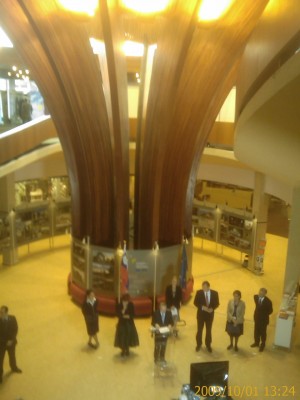
The Chairman of the CoE, Slovenian President spoke to "EuroFora" the day he inaugurated in Strasbourg an Exhibition on a common EU - CoE Program for the protection of Cultural Heritage in post-Conflict situations, as in the Balkans, etc., where EU Commision's representative expressed the hope that it may spread also to other conflict-stricken countries, (as in Cyprus, Caucasus, etc).
- "Protectiion of Cultural Heritage is important also for Inter-Cultural Dialogue", stressed at this occasion CoE's Director on Culture and Education, Gabriella Battaini-Dragoni.
***
New CoE SG Jagland to EuroFora on Sarkozy-Merkel idea: EU-Russia-Turkey+ Economy-Human Rights Area
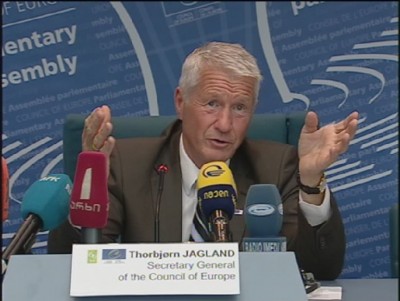
Replying to "EuroFora"s questions and later in an exclusive interview, new CoE's Secretary General, Thorbjorn Jagland, welcomed and associated himself with the idea, recently launched by French President Sarkozy with German Chancellor Merkel and the support of Russian Prime Minister Putin, to create a Common Space for Economy, Politics, Human Rights and Democracy standards, between EU and Russia, Turkey and other countries.
Speaking before a landmark debate on the "Future" of Council of Europe in Strasbourg, Jagland, a former Prime Minister and Foreign Minister of Norway, currently President of Parliament and of the Nobel "Peace" Prize Committee, agreed with "EuroFora", concerning CoE's competences, that "Human Rights and Democracy are also Peace-building".
Even if they don't yet give "Hotlines at the Media", nevertheless, Human Rights are "very important in People's Minds !", he agreed, expressing his readiness to "consider" any "new project" that "EuroFora" might eventually present in order to "unite all efforts" to boost CoE's "visibility".
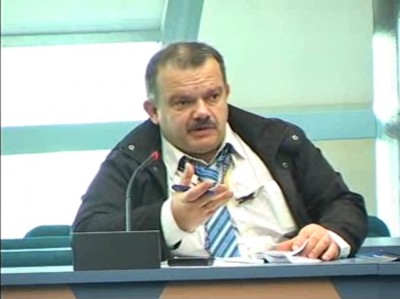
- "Norway, your country, as well as Switzerland, which will chair soon CoE's Ministers, are among European countries which aren't yet EU Members, but part of an "European Economic Space", and have a Special Status. Now that CoE debates on its"Future", what's your opinion about a parallel vision, recently by French President Sarkozy in agreement with German Chancellor Merkel, supported also by Russian Prime Minister Putin and others", already presented by Sarkozy to new USA President Obama, "to create a kind of "Common Space" in Europe, where Russia, but also Turkey and other countries, independently of the EU (Enlargment) questions, might share not only Economic, but also Legal and (Human Rights) Values' and standards ?", "EuroFora" asked Jagland.
- "I very much associate myself with the ideal to have a Common Space for Economy and Politics and everything (you said) on the entire continent", Jagland replied to "EuroFora"'s question, (but without explicitly saying if he included, or not, also Turkey), at his 1st Press Conference after his election as new CoE's SG for the 2009-2014 five years period.
- "You referred to the EEA agreements that we have between Norway and other EFTA countries with the EU, which is a real (common) Economic space, because we have the same Rules and Laws also for Economy", he observed.
- "If there is an idea to expand it to other parts of Europe, I would welcome it very much", CoE's new SG stressed.
- "Although I think that it's quite a big challenge to do it !", he carefully warned smiling..
- "Because, as you know", "when it comes to Economy, it's not the same", as in CoE's competences which notoriously focus on Human Rights, Democracy and Law, particularly since the decisions taken by the 2005 Warsaw Summit of the PanEuropean organization's Heads of State and Government.
But, replying also to another "EuroFora" question on "core Human Rights issues", in this regard, Jagland appeared more upbeat :
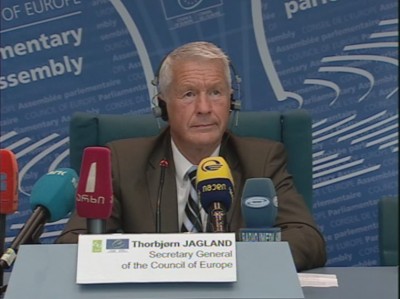
- "Absolutely !", the new CoE's SG agreed strongly.
- "That is why we have the CoE !", his new chief stressed, showing that he considered that as an existential issue for Strasbourg's PanEuropean Organization.
- I.e. "in order to enhance Human Rights, spreading Democracy to the entire Continent". And this is something "which is (also) Peace-building, indeed", Jagland agreed.In this regard, he pointed at 2 things :
- "We (CoE) do have : (1) these Common Standards and (Human Rights) Values under the Conventions which we have at the CoE ; and (2) the Court, which is an instrument to implement them", he concluded, putting an accent on ECHR judgements' implementation.
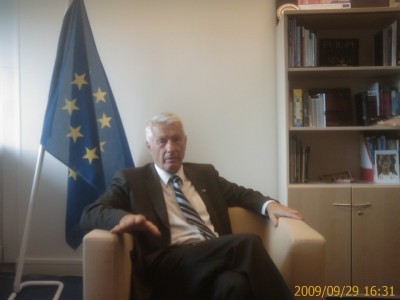
- "But it doesn't always create the Headlines in the Media", Jagland regretted, rightfully critical.
- "Because CoE is working with issues which are not giving immediate "Hotlines" in the Media", he observed later, in an exclusive interview with "EuroFora".
- However, Human Rights and Democracy, are an important, relevant issue, (at least) sometimes. Aren't they ?", "EuroFora" wondered.
- "It should be", CoE's new SG carefully replied. Nevertheless, "when it comes to being visible, it's not that easy".
- "But it is very, very important in People's Minds", Jagland stressed.
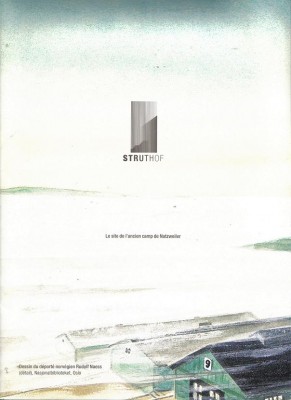
- So, "I think that it's possible to make it (CoE) more visible". "But it depends, very much, on how relevant we are : If we are relevant, if we can contribute to something, then, I think that it's possible to be "visible", Jagland agreed. - Even if "there has been recently an amelioration", recently, "about CoE's visibility, ... "several People hope on you to do something ", observed "EuroFora".
- "I don't know, I don't have any particular idea now", Jagland replied, while recognizing the importance oif the issue. And, when "EuroFora" asked him if, " in order to be succesful, and unite all efforts", he " would be ready to consider also New Projects, based on experience of more than 15 years, if they are proposed ?", CoE's new SG replied positively ; - "Well, yes, if they are", he accepted.
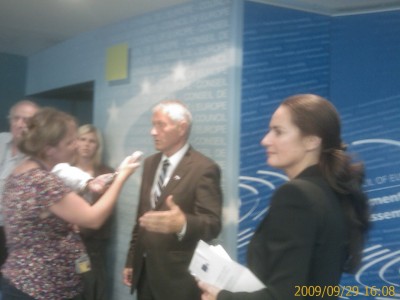
(Jagland explaining later his views to the French Press, after his reply to "EuroFora" question on the Sarkozy-Merkel-Putin idea, under the careful and beautiful ear of CoE's Director of Communications, Seda Pumpyanskaya from Russia).
---
- New CoE SG must fil Legitimity Gap by New Balance with Parliamentarians says Top MEP before key vote
- CoE to create PanEuropean "Early Warning" forum, linking Human Rights/Democracy and Peace
- EU rejects Turkey's Nabucco blackmail and fund demands, starts Solar Energy and eyes Arctic Sea+
- EU 2009 Swedish Presidency backs Franco-German move for Environment and against Carbon Dumping
Main Menu
Home Press Deontology/Ethics 2009 Innovation Year EU endorses EuroFora's idea Multi-Lingual FORUM Subscribers/Donors FAQs Advanced search EuroFora supports Seabird newsitems In Brief European Headquarters' MAPs CoE Journalists Protection PlatformBRIEF NEWS
- 00:00 - 02.06.2021
- 00:00 - 18.10.2020
- 00:00 - 19.06.2020
- 00:00 - 18.05.2020
- 00:00 - 20.04.2020
- 00:00 - 02.02.2020
- 00:00 - 09.12.2019
- 00:00 - 27.11.2019
- 00:00 - 16.11.2019
Popular
- Yes, we could have prevented Ferguson riots says World Democracy Forum's Young American NGO to ERFRA
- Spanish People Elect CenterRIGHT Majority with 1st Party and Total of 178 MPs (6 More than the Left)
- Pflimlin's vision
- The European Athletic "Dream Team", after Barcelona 2010 Sport Championship Results
- Source Conseil d'Europe à ERFRA: Debatre Liberté d'Opposants à Loi livrant Mariage+Enfants à Homos ?
- Head of BioEthics InterGroup, MEP Peter Liese : "Embryonic stem cell research reaching its END" !?
- Spain: Jailed Turkish Terror suspect with Explosive,Drones,Chechen accomplices stirs Merah+ Burgas ?
- UN Head Ban Ki Moon at CoE World Democracy Forum : - "Listen to the People !"
Latest News
- Test Photos (f.ex.+ Invit to EU + Korea Peace meeting)
- EUOmbudsmen Conference 2022: Digital Gaps affect People's Trust threaten EF Project on EU Future ?
- French Election : Black Out on Virus, but Obligation for Fake 'Vaccines" Challenged
- Both French Presidential Candidates point at "Humanism" in crucial times...
- France : Zemmour = Outsider may become Game Changer in Presidential + Parliamentary Elections 2022
Statistics
Visitors: 62257718Archive
Login Form
Other Menu
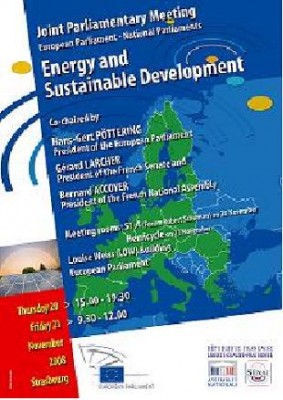
Strategically located between Paris and Prague, Strasbourg offered a natural location for the French and Czech EU 2008 and 2009 Presidencies to tune their agendas for a resolute European move towards Renewable Energies, during an exceptional Joint Parliamentary meeting on "Energy and Sustainable Development", co-organized here by the Presidents of EU Parliament, Hans Gert Poettering, French National Assembly, Bernard Accoyer, and Senate, Gerard Larcher, on November 20 and 21.
Concluded by a busy-looking French super-Minister of Energy, Environment and Regional planning, Jean-Louis Borloo, the exceptional gathering of Top MPs from all 27 EU States' Parliaments hoped that a Ministerial meeting prepared by Borloo, will pave the way to an overall agreement at the level of EU Heads of State and Government Summit chaired on December 2008 by French President Nicolas Sarkozy, allowing the next EU chair, the Czech Republic, to start working from the beginning of 2009 on concrete measures.
Speaking to "EuroFora" President Accoyer resumed the general feeling by stressing that "Europe has no Oil-Gas resources, but an important Scientific-Technologic potential. Therefore, we must develop Renewable Energy sources". "Since the Sun is the most abundant and free RES, we must do the outmost to boost Solar Energy" solutions, he added, at the eve of a special meeting on Solar energy and the Mediterranean organised by Borloo on Saturday.
Oil-gas supplies' security and diversification were also examined by the EU gathering, after which, President Accoyer replied to our question on risks of long, expensive and fragile pipe-lines' projects, crossing through foreign countries out of the EU, compared to new possibilities for Sea and River Ship direct EU transport even of Gas, thanks to New Liquification technologies : - "We have just écreated the Union for the Mediterranean for concrete projects like these", Accoyer stressed, speaking of Sea-River Ship Highways, fundeable under EU's TENS programs.
Rapporteur on "Energy innovation and sustainable development", Dr. Bedrich Moldan, vice-President of Czech Senate's Environment and Regional Development Committee, added that Climat issues, price uncertainties and diminution of accessible Fossil energies, played together with EU's RST potential in order to make RES both a need and "an opportunity". However, in cases as "Solar Energy, even if the main Scientific ideas are already here, we have to make some technologic breakthroughs in order to find how to produce it on a large scale, store and transport it", Dr. Moldan added to "EuroFora".
Czech interest for RES was also expressed, earlier in Strasbourg, by Jan Kohout, the deputy Minister pf Foreign Affairs who participated to a workshop on "Renewable Energies" organized by the French EU 2008 Presidency : - "The focus is on Development", he told us.
On this and other RES issues, Dr. Moldan anounced the Czech EU 2009 chair's intention to organize an important 2-days Conference on Renewable Energies and Sustainable Development late January 2009 at nearby Prague.


















